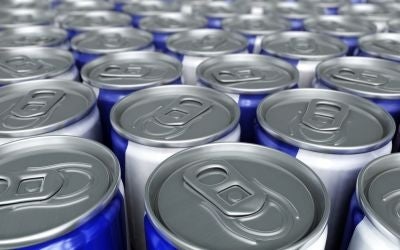Energy drinks have more serious side effects left under-researched, finds report
Mental health problems and risk-seeking behaviour linked with the caffeinated drinks

There is emerging evidence that energy drinks can be linked to kidney damage, poor mental health and risk-seeking behaviour, including substance abuse, a according to a new report.
While they cause tooth decay, poor sleep and weight gain, they study published in Frontiers in Public Health said too much research had in the past focused on the effect of caffeine and sugar, instead of the possible harmful effects of other ingredients often found in energy drinks.
The researchers are now calling for governments to bring in laws tackling energy drinks specifically.
“The excess caffeine may contribute to cardiovascular outcomes, such as increased blood pressure,” the study's co-author Josiemer Mattei, told Yahoo Lifestyle.
The assistant professor of nutrition at the Harvard TH Chan School of Public Healthm added: “The caffeine amount at which these symptoms may occur is lower for children and adolescents than for adults, making the high content of caffeine in energy drinks so concerning for younger age groups."
As result the report stated that "policy makers should consider creating a separate regulatory category for [energy drinks], setting an evidence-based upper limit on caffeine, restricting sales of [energy drinks], and regulating existing [energy drinks] marketing strategies, especially among children and adolescents."
One US study of secondary school students conducted between 2010 and 2011 found significant associations between how regularly the pupils drank energy drinks and the frequency with which they drank alcohol, smoked cigarettes and used drugs.
Additionally, the drinks were associated with mental health problems.
"Some studies have additionally found evidence for an association between [energy drink] consumption and mental health, including stress, anxiety, depressive symptoms, and suicidal ideation, plan or attempt," the report said.
One of the potentially harmful ingredients in many energy drinks was sugar. A typical 500 ml can of energy drink contains around 54g of the sucrose, it added.
Excessive sugar consumption is linked to a host of health problems, including Type-2 diabetes and The British Heart Foundation recommends consuming a maximum of 30g a day — making one can almost double the daily recommended intake.
Meanwhile, some energy drinks contain as much as 207mg of caffeine per 2oz, according to the review. While consuming up to 400mg of caffeine a day is generally considered safe and even beneficial for health among adults, there has not been enough research conducted on children and teenagers, who are targeted by energy drink marketing, the report said.
There here are a host of other ingredients contained in energy drinks including gaurana, taurine and ginseng, about which relatively little is known. Further research is needed into these stimulants, the report stated.
Join our commenting forum
Join thought-provoking conversations, follow other Independent readers and see their replies
Comments